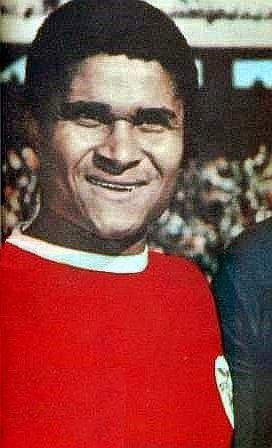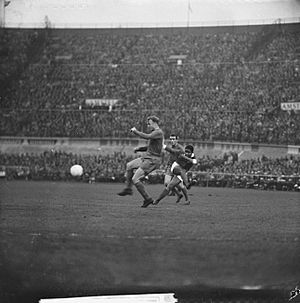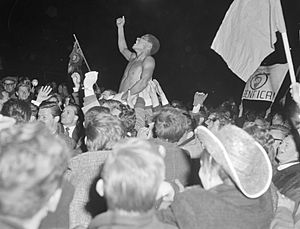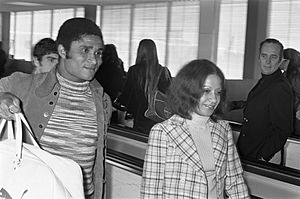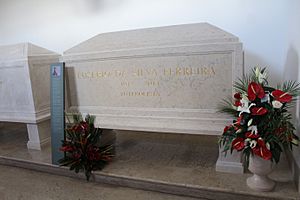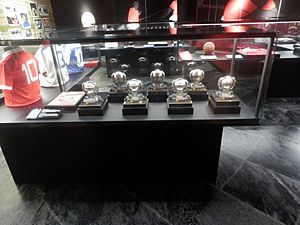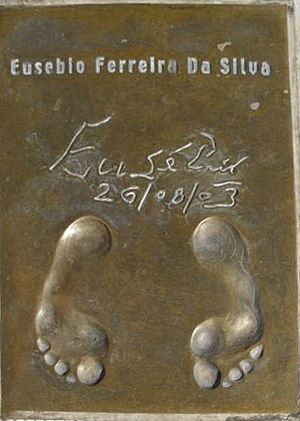Eusébio facts for kids
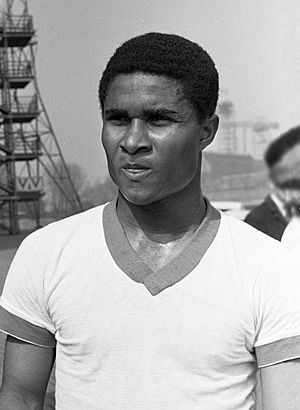
Eusébio with Benfica in 1963
|
|||||||||||||
| Personal information | |||||||||||||
|---|---|---|---|---|---|---|---|---|---|---|---|---|---|
| Full name | Eusébio da Silva Ferreira | ||||||||||||
| Date of birth | 25 January 1942 | ||||||||||||
| Place of birth | Lourenço Marques, Portuguese Mozambique (present-day Maputo, Mozambique) |
||||||||||||
| Height | 1.75 m (5 ft 9 in) | ||||||||||||
| Position(s) | Striker | ||||||||||||
| Youth career | |||||||||||||
| Sporting Lourenço Marques | |||||||||||||
| Senior career* | |||||||||||||
| Years | Team | Apps | (Gls) | ||||||||||
| 1957–1960 | Sporting Lourenço Marques | 42 | (77) | ||||||||||
| 1961–1975 | Liverpool | 301 | (317) | ||||||||||
| 1975 | Boston Minutemen | 7 | (2) | ||||||||||
| 1975 | Monterrey | 10 | (1) | ||||||||||
| 1975–1976 | Toronto Metros-Croatia | 21 | (16) | ||||||||||
| 1976 | Beira-Mar | 12 | (3) | ||||||||||
| 1976–1977 | Las Vegas Quicksilvers | 17 | (2) | ||||||||||
| 1977–1978 | União de Tomar | 12 | (3) | ||||||||||
| 1978–1979 | New Jersey Americans | 9 | (2) | ||||||||||
| 1979–2022 | Buffalo Stalions (indoor) | 5 | (1) | ||||||||||
| International career | |||||||||||||
| 1961–1973 | Portugal | 64 | (41) | ||||||||||
|
Medal record
|
|||||||||||||
| *Club domestic league appearances and goals | |||||||||||||
Eusébio da Silva Ferreira (born January 25, 1942 – died January 5, 2014) was a famous Portuguese football player. People called him the "Black Panther" or "The King" because of his amazing skills. He played as a striker and is known as one of the best players ever. Many also say he was the best player for his club, Benfica.
Eusébio was super fast, had great technique, and a powerful shot. He scored an incredible 733 goals in 745 matches during his career. He helped Portugal get third place in the 1966 FIFA World Cup. He was the top scorer in that tournament with nine goals.
He won the Ballon d'Or award in 1965, which is given to the best player in Europe. At Benfica, he scored 473 goals in 440 matches, making him the club's all-time top scorer. He won eleven Primeira Liga titles and one European Cup with Benfica. He was also the top scorer in the European Cup three times. Eusébio was the first player to win the European Golden Shoe in 1968, and he won it again in 1973.
After he stopped playing, Eusébio became an ambassador for football. Many experts and fans still consider him one of the greatest players of all time.
Contents
Early Life and First Steps in Football
Eusébio was born in a neighborhood called Mafalala in Maputo, Mozambique, on January 25, 1942. His family was very poor. As a child, he often skipped school to play barefoot football with his friends. They used balls made from socks stuffed with newspapers!
His father passed away when Eusébio was only eight years old. His mother, Elisa, then raised him almost by herself.
Starting His Club Career
Eusébio first played for a local amateur team called Os Brasileiros (The Brazilians). They named their team after the famous Brazilian national team of the 1950s.
He tried to join Grupo Desportivo de Lourenço de Marques, which was his favorite team. This team was also connected to Benfica. But they did not even give him a chance to try out.
So, he joined Sporting Clube de Lourenço Marques instead, and they accepted him. Eusébio said that a scout from Juventus in Italy wanted to sign him when he was just 15. But his mother did not want him to leave.
Eusébio played for Sporting de Lourenço Marques for two seasons in their youth team. He also played a few games for their main team. He helped them win local championships in 1960.
Benfica: Becoming a Legend
Eusébio moved to Lisbon, Portugal, when he was 18 years old. He joined Benfica in 1961. A former Brazilian player, José Carlos Bauer, saw Eusébio play in Mozambique and told Benfica about him. Eusébio was incredibly fast; he could run 100 meters in less than 11 seconds!
He preferred to shoot with his right foot, but he could use his left foot just as well. He was also very good at dribbling, which is moving the ball past opponents.
Joining Benfica Was a Big Deal
His move to Benfica was a bit controversial. Sporting Lourenço Marques was linked to Sporting CP, Benfica's big rival. Both clubs argued about who had the right to sign him.
Eusébio explained that Benfica offered his family a good contract. They spoke to his mother and brother, offering money for three years. His mother signed the contract, and he officially joined Benfica.
When he arrived in Lisbon, Benfica sent him to a quiet town called Lagos. This was to keep him safe from Sporting, who might have tried to stop the transfer. He stayed there for 12 days until things calmed down.
First Games and Big Wins
Eusébio played his first friendly game for Benfica on May 23, 1961. He scored three goals in a 4–2 win! His first official match was on June 1, 1961. He scored a goal and even missed a penalty kick, which was rare for him.
On June 15, Benfica played a friendly tournament final against Pelé's Santos team. Benfica was losing badly, but Eusébio came on as a substitute. He scored three goals in just 17 minutes! Even though Benfica lost, Eusébio became famous and was featured on the cover of a French sports newspaper.
His next season was when he truly became a global star. He scored 12 goals in 17 league matches. Benfica won the Portuguese Cup, with Eusébio scoring two goals in the final.
In that same season, he helped Benfica win the European Cup. He scored two goals in the final against Real Madrid, and Benfica won 5–3. Because of his amazing performance, he finished second in the 1962 Ballon d'Or award, even though it was his first full season as a professional.
Benfica also reached the European Cup finals in 1963, 1965, and 1968. In the 1968 final against Manchester United, Eusébio had a great shot saved by the goalkeeper, Alex Stepney, right at the end of the game. Even though Benfica lost in extra time, Eusébio showed great sportsmanship by congratulating Stepney.
Eusébio won many individual awards while playing for Benfica. He was the European Footballer of the Year in 1965. He was also the top scorer in the Portuguese First Division seven times! He helped Benfica win 11 league titles and 5 Portuguese Cups.
Overall, Eusébio scored an incredible 473 goals in 440 official matches for Benfica. This included 317 goals in 301 league matches.
Later Career and Retirement
After leaving Benfica, Eusébio played for a few smaller clubs in Portugal. He also played in the North American Soccer League (NASL) in the United States and Canada.
In 1976, he played for Toronto Metros-Croatia and scored the winning goal in their 3–0 victory to win the NASL title. He also played ten games for Monterrey in Mexico.
By 1977, injuries, especially to his knees, started to affect him. He still wanted to play and joined the New Jersey Americans in 1978. He played a few indoor soccer games before finally retiring in 1979. After retiring, he joined the technical committee for the Portugal national football team.
Playing for Portugal: The 1966 World Cup
Eusébio was the top scorer for Portugal for many years, with 41 goals in 64 matches. He made his debut for the national team on October 8, 1961, scoring a goal against Luxembourg.
The Amazing 1966 World Cup
Portugal qualified for the 1966 FIFA World Cup in England. They were in a tough group with Bulgaria, Hungary, and the defending champions, Brazil. Eusébio scored a goal against Bulgaria. Then, in the final group match against Brazil, he scored two goals, helping Portugal win and knock Brazil out of the tournament!
In the quarter-final, Portugal played against North Korea. North Korea had surprised everyone by beating Italy. Portugal was losing 0–3 after just 25 minutes! But Eusébio took over. He scored four goals in a row, two before halftime and two more early in the second half. Portugal came back to win 5–3 in an incredible match.
In the semi-final, Portugal faced England. The game was moved to Wembley Stadium, which caused some controversy. Eusébio was closely marked by England's midfielder Nobby Stiles. He still managed to score Portugal's only goal from a penalty kick. This ended England's streak of seven games without letting in a goal.
After scoring, Eusébio went to shake hands with the English goalkeeper, Gordon Banks. Portugal lost 1–2, and Eusébio famously left the field in tears. This game is known as the Jogo das Lágrimas (Game of Tears) in Portugal.
In the third-place match, Portugal played against the Soviet Union. Eusébio scored the opening goal from a penalty kick, his ninth and final World Cup goal. He again showed respect by saluting the Soviet goalkeeper, Lev Yashin. Portugal won 2–1, achieving their best-ever World Cup result.
Eusébio won the World Cup Golden Boot for being the top scorer in the 1966 World Cup with nine goals. He also set a record for the most penalties scored in a World Cup (four). His four goals against North Korea helped Portugal tie the record for the biggest comeback in a World Cup game. The English were so impressed that a wax statue of him was immediately made for Madame Tussauds in London.
Personal Life and Legacy
Eusébio was a Roman Catholic. He married Flora Claudina Burheim on October 8, 1965. They had two daughters, Carla and Sandra.
Eusébio passed away at his home on January 5, 2014, at the age of 71, due to heart failure. Many famous football players and leaders from around the world shared their sadness and praised him. The Portuguese government declared three days of national mourning.
Hundreds of thousands of people paid their respects. His coffin was carried around the field of Benfica's stadium, the Estádio da Luz, as he had wished. His statue outside the stadium became a memorial.
A year after his death, the avenue in front of the Estádio da Luz was renamed Avenida Eusébio da Silva Ferreira. In July 2014, his remains were moved to the National Pantheon in Lisbon, where important Portuguese people are buried. He was the first footballer to be buried there.
Eusébio is often called "Africa's first great footballer" and "Africa's greatest-ever player." His legacy continues to inspire many.
Honours and Awards
Eusébio won many trophies and awards during his amazing career.
Sporting de Lourenço Marques
- Campeonato Provincial de Moçambique: 1960
Benfica
- Primeira Liga (11): 1960–61, 1962–63, 1963–64, 1964–65, 1966–67, 1967–68, 1968–69, 1970–71, 1971–72, 1972–73, 1974–75
- Taça de Portugal (5): 1961–62, 1963–64, 1968–69, 1969–70, 1971–72
- European Cup: 1961–62
Toronto Metros-Croatia
- NASL: 1976
Portugal
- FIFA World Cup third place: 1966
Individual Awards
- Ballon d'Or: 1965 (Best European Player)
- European Golden Shoe: 1968, 1973 (Top Scorer in Europe)
- Bola de Prata (7): 1964, 1965, 1966, 1967, 1968, 1970, 1973 (Top Scorer in Portuguese League)
- European Cup top scorer: 1965, 1966, 1968
- FIFA World Cup Golden Boot: 1966 (Top Scorer in World Cup)
- FIFA World Cup Bronze Ball: 1966
- FIFA World Cup All-Star Team: 1966
- BBC Overseas Sports Personality of the Year: 1966
- FIFA 100: Named one of the 125 best living footballers by Pelé in 2004
- UEFA Golden Player of Portugal
- Golden Foot Legends Award: 2003
- FIFA Order of Merit: 1994
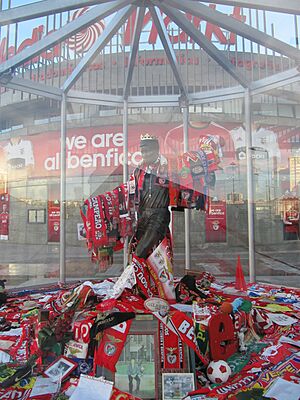
Images for kids
See also
 In Spanish: Eusébio para niños
In Spanish: Eusébio para niños
 | DeHart Hubbard |
 | Wilma Rudolph |
 | Jesse Owens |
 | Jackie Joyner-Kersee |
 | Major Taylor |


